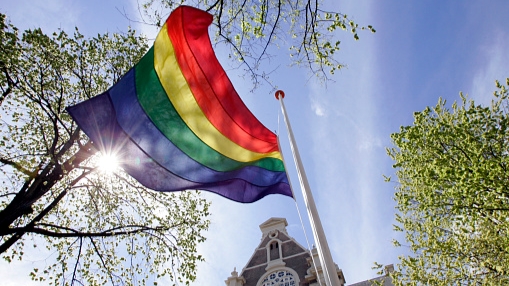A recent report by Springtide Research Institute found that many Gen Z-ers still feel religious communities aren't genuinely interested in supporting the LGBTQ+ community. Specifically, In Springtide's study, The State of Religion & Young People 2021, 56% of Gen Z participants expressed that they didn't believe faith groups cared about LGBTQ+ rights.
In the grand scope of the fight for LGBTQ+ rights, religious groups don't necessarily have the best history with the community. However, there has been an overall surge in support for the LGBTQ+ community in recent years, including many religious individuals and organizations.
In Feb. 2021, over 100 religious groups expressed their support for the Equality Act, which would provide the LGBTQ+ community with additional legal protections from discrimination. It's also fairly common to see churches openly market themselves as LGBTQ+-affirming.
This development comes at a time when about 1 in 6 Gen Z adults identify as LGBTQ+, showing that the community is continuing to grow as young Americans become more in touch with their sexuality and gender identity.
Our new study, #ReligionAndYoungPeople2021, asked #GenZ how much they care about social issues like racial justice, gender equity & environment, and how much they think faith groups care about those issues.
On reproductive rights, there's a 17% gap.https://t.co/PnD4bma83E
pic.twitter.com/VeXUGaACjQ— Springtide Research Institute (@WeAreSpringtide) January 6, 2022
"There is a refusal to engage fully. There is superficial acceptance of LGBTQ+ identities, but the language regarding LGBTQ+ acceptance in churches is often full of qualifiers — still regarding us as an 'other,'" Matthew Blasio, a 22-year-old who identifies as spiritual, said.
"Sometimes religious leaders act with forced love, pretending to lower themselves to our level just to seem like heroes," he continued. "It's more of a selfish love, riddled with misunderstandings."
As a result of many religious groups perceive a "superficial acceptance" and have been turned off from seeking community in these settings.
"I have no interest in uprooting my beliefs and values for the benefit of someone else feeling that they're saving me," Blasio added. "If someone is less than or has less rights, just because of how they were born, yet their god is supposed to love everyone equally, then their god must not be the one for me or my friends."
Faryn, a 16-year-old who actively identifies as Catholic, shared similar sentiments.
"Many people believe that associating with a faith that is anti-LGBTQ+ [in Scripture] makes them just as immoral as homophobic and transphobic religious leaders," they explained.
These findings suggest that religious groups are primarily losing touch with Gen Zers by not actively fighting against the discriminatory practices, beliefs, and micro-aggressions that target the LGBTQ+ community.
All hope may not be lost, though, as more and more people — including religious leaders — become more affirming of LGBTQ+ identities with time. Presently, many Gen Z-ERs feel alienated by the overall religious community's stance on the subject.

